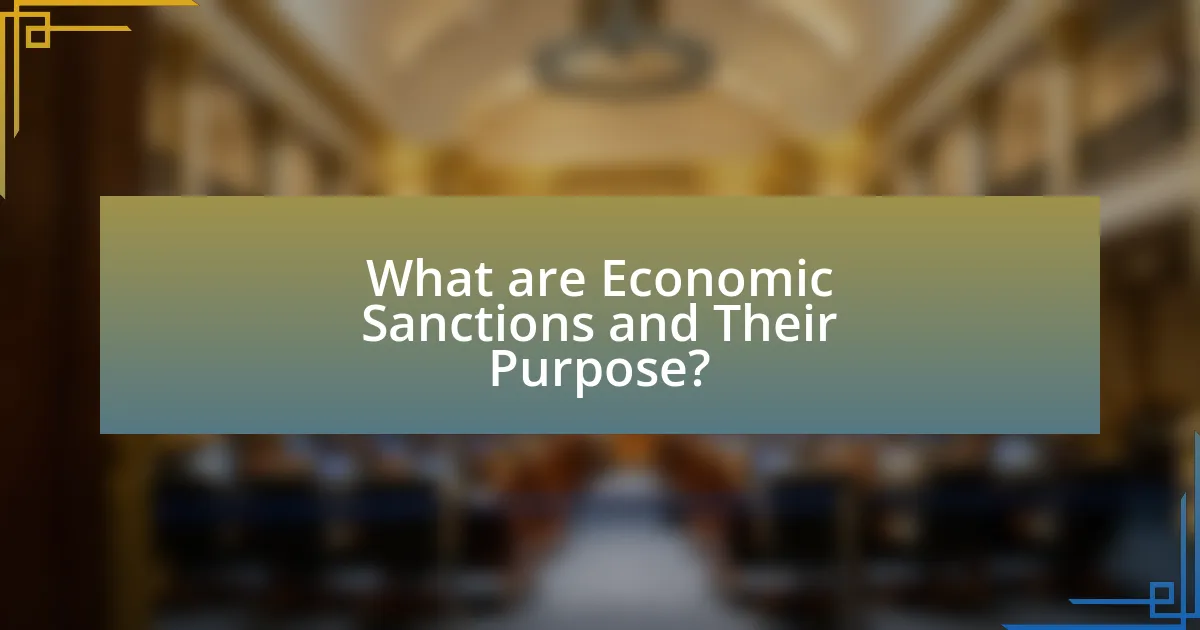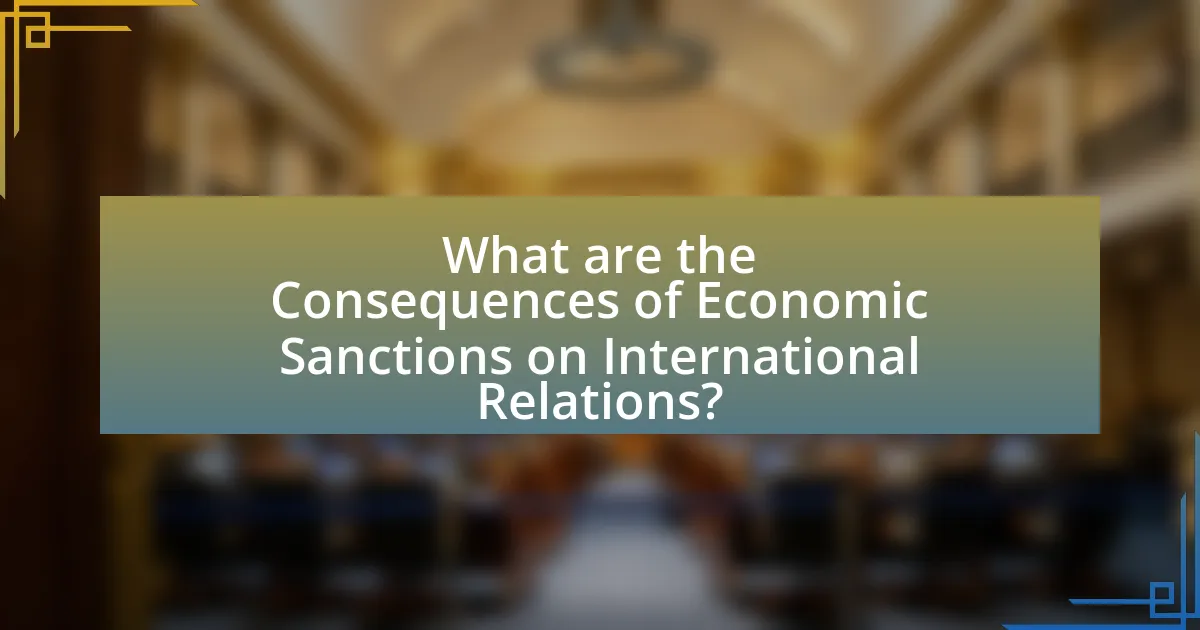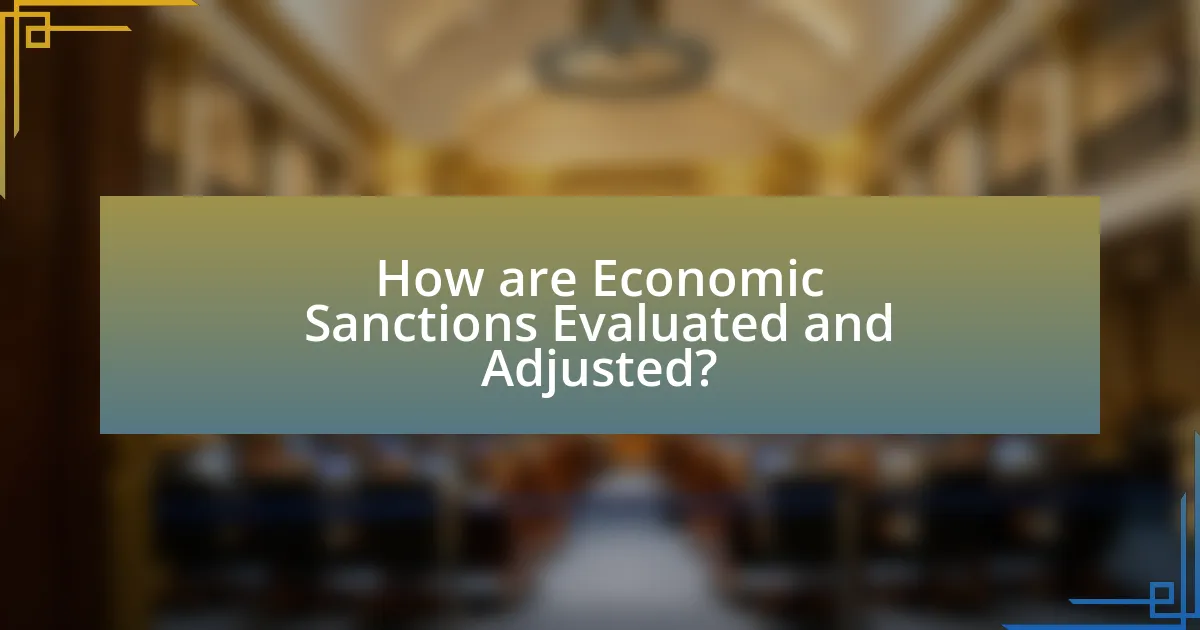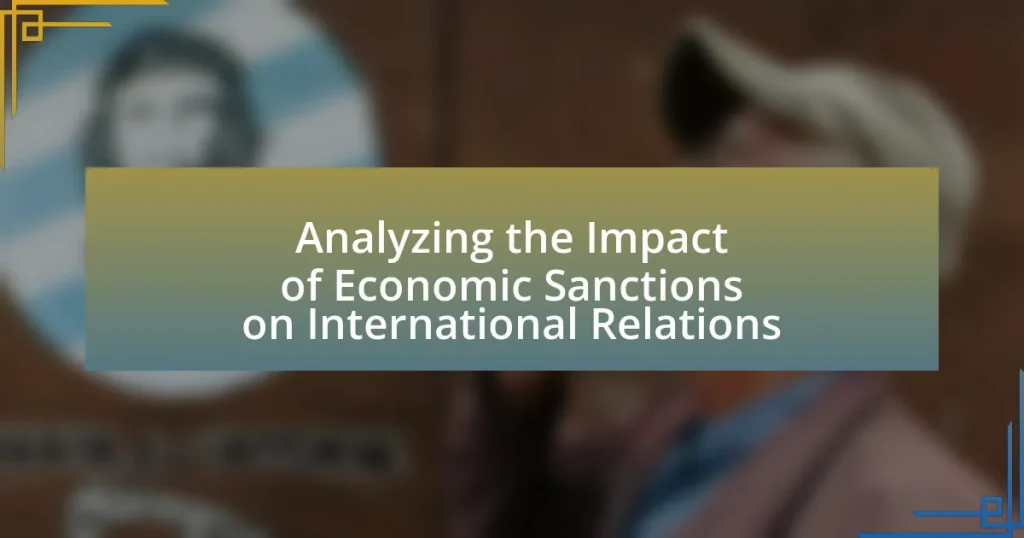Economic sanctions are restrictive measures imposed by countries or international organizations to influence the behavior of targeted nations, groups, or individuals, primarily aimed at enforcing compliance with international laws or norms. This article analyzes the various types of economic sanctions, their functions in international relations, and their impact on the economies and diplomatic relations of targeted nations. It explores the political objectives behind sanctions, their unintended consequences, and the metrics used to evaluate their effectiveness. Additionally, the article discusses best practices for implementing sanctions to minimize negative impacts on civilian populations while achieving desired political outcomes.

What are Economic Sanctions and Their Purpose?
Economic sanctions are restrictive measures imposed by countries or international organizations to influence the behavior of a target nation, group, or individual. Their primary purpose is to compel compliance with international laws or norms, deter undesirable actions, or punish violations, such as human rights abuses or aggression. For instance, the United Nations has implemented sanctions against North Korea to curb its nuclear weapons program, demonstrating how sanctions can serve as a tool for international diplomacy and security.
How do Economic Sanctions function in International Relations?
Economic sanctions function in international relations as tools used by countries or international organizations to influence the behavior of a target state by imposing economic restrictions. These sanctions can include trade barriers, tariffs, and restrictions on financial transactions, aimed at compelling the target to change specific policies or actions, such as human rights violations or military aggression. For instance, the United States imposed economic sanctions on Iran to deter its nuclear program, which significantly impacted Iran’s economy, leading to reduced oil exports and inflation. The effectiveness of these sanctions often depends on the level of international support and the target state’s economic resilience.
What types of Economic Sanctions are commonly used?
Economic sanctions commonly used include trade sanctions, financial sanctions, and targeted sanctions. Trade sanctions restrict the exchange of goods and services with a specific country, often aimed at limiting its economic capabilities. Financial sanctions involve prohibiting access to financial markets or freezing assets, which can severely impact a nation’s economy. Targeted sanctions, also known as smart sanctions, focus on specific individuals or entities, such as government officials or companies, to minimize broader economic harm while still exerting pressure. These types of sanctions have been employed in various international contexts, such as the United Nations sanctions against North Korea and the U.S. sanctions on Iran, demonstrating their role in influencing international relations.
How do Economic Sanctions differ from other forms of diplomatic pressure?
Economic sanctions differ from other forms of diplomatic pressure primarily in their coercive economic impact, targeting a nation’s economy to achieve political objectives. Unlike diplomatic negotiations or verbal condemnations, economic sanctions impose restrictions on trade, financial transactions, or access to resources, directly affecting a country’s economic stability. For instance, the United States imposed economic sanctions on Iran, significantly impacting its oil exports and overall economy, which aimed to compel Iran to alter its nuclear program. This economic leverage distinguishes sanctions from softer diplomatic measures, which may rely on persuasion or dialogue without direct economic consequences.
Why are Economic Sanctions imposed by countries?
Economic sanctions are imposed by countries primarily to influence the behavior of other nations or entities, often in response to actions deemed unacceptable, such as human rights violations or aggression. These measures aim to exert economic pressure, thereby compelling the targeted country to change its policies or actions. For instance, the United States imposed sanctions on Iran to deter its nuclear program, which was viewed as a threat to regional stability and international security. Such sanctions can include trade restrictions, asset freezes, and financial barriers, which collectively aim to isolate the targeted nation economically and politically.
What political objectives do Economic Sanctions aim to achieve?
Economic sanctions aim to achieve specific political objectives such as altering a target country’s behavior, enforcing international norms, and signaling disapproval of actions like human rights violations or aggression. These sanctions are often employed to compel governments to change policies or actions that are deemed unacceptable by the international community. For instance, the United Nations imposed sanctions on Iraq in the 1990s to pressure the regime to comply with disarmament obligations following the Gulf War. This illustrates how sanctions serve as a tool for states to influence the political landscape and promote compliance with international standards.
How do Economic Sanctions impact the targeted nation’s economy?
Economic sanctions significantly impair the targeted nation’s economy by restricting trade, investment, and access to financial markets. These sanctions can lead to decreased GDP, increased inflation, and higher unemployment rates. For instance, following the imposition of sanctions on Iran in 2012, the country’s GDP contracted by approximately 6.6% in 2013, and inflation soared to over 40%. Additionally, sanctions can disrupt essential imports, such as food and medicine, exacerbating humanitarian crises and leading to social unrest. The cumulative effect of these economic pressures often results in long-term damage to the nation’s economic infrastructure and stability.

What are the Consequences of Economic Sanctions on International Relations?
Economic sanctions significantly alter international relations by straining diplomatic ties and fostering economic isolation. These sanctions often lead to retaliatory measures from targeted nations, which can escalate tensions and create long-term rifts. For instance, the sanctions imposed on Iran have not only affected its economy but have also complicated relations with countries that support or oppose these measures, such as the United States and European nations. Additionally, sanctions can push affected countries to seek alliances with non-Western powers, as seen with Russia’s pivot towards China following Western sanctions. This shift can realign global power dynamics and influence international trade patterns, as countries adapt to new economic realities.
How do Economic Sanctions affect diplomatic relations between countries?
Economic sanctions significantly strain diplomatic relations between countries by creating economic barriers that hinder trade and cooperation. These sanctions often lead to increased tensions, as the targeted nation may perceive them as acts of aggression, resulting in retaliatory measures or a breakdown in dialogue. For instance, the sanctions imposed on Iran by the United States have led to a deterioration of relations, making diplomatic negotiations over nuclear programs more challenging. Additionally, research from the National Bureau of Economic Research indicates that sanctions can reduce bilateral trade by up to 50%, further isolating the sanctioned country and complicating diplomatic efforts.
What are the short-term effects of Economic Sanctions on international diplomacy?
Economic sanctions can lead to immediate diplomatic isolation for the targeted nation. This isolation often results in a breakdown of communication channels and a reduction in diplomatic engagement, as countries may distance themselves from the sanctioned state to avoid repercussions. For instance, following the imposition of sanctions on Russia in 2014 due to its annexation of Crimea, many nations curtailed diplomatic relations, leading to a significant decrease in Russia’s participation in international forums. Additionally, sanctions can provoke retaliatory measures from the targeted state, further escalating tensions and complicating diplomatic negotiations. The short-term effects thus include heightened geopolitical tensions, diminished trust among nations, and a potential shift in alliances as countries reassess their diplomatic strategies in response to the sanctions.
How can Economic Sanctions lead to long-term geopolitical shifts?
Economic sanctions can lead to long-term geopolitical shifts by altering the economic stability and political dynamics of targeted nations. When a country faces sanctions, its economy often suffers due to restricted trade, investment, and access to financial markets, which can lead to social unrest and changes in governance. For example, the sanctions imposed on Iran since 2010 significantly impacted its economy, leading to widespread protests and a shift in public sentiment against the ruling government. This economic pressure can create opportunities for opposition groups to gain traction, potentially resulting in regime change or a re-evaluation of foreign policy. Additionally, sanctions can push targeted nations to seek new alliances and partnerships, as seen with Russia’s pivot towards China following Western sanctions after its annexation of Crimea in 2014. Such shifts can realign global power structures and influence international relations for years to come.
What are the potential unintended consequences of Economic Sanctions?
Economic sanctions can lead to several unintended consequences, including humanitarian crises, economic destabilization, and increased anti-Western sentiment. Humanitarian crises often arise as sanctions restrict essential goods, such as food and medicine, leading to suffering among the civilian population. For instance, sanctions imposed on Iraq in the 1990s resulted in significant malnutrition and health issues among children, with estimates indicating that over 500,000 children died due to the lack of medical supplies and food. Economic destabilization can occur as sanctions disrupt trade and investment, causing long-term damage to the targeted economy and potentially destabilizing the region. Additionally, sanctions can foster increased anti-Western sentiment, as affected nations may rally around their leadership in opposition to perceived external aggression, exemplified by the rise of nationalism in countries like Iran following U.S. sanctions. These consequences illustrate that while sanctions aim to compel political change, they can inadvertently harm civilians and entrench adversarial attitudes.
How do Economic Sanctions impact civilian populations in targeted countries?
Economic sanctions significantly impact civilian populations in targeted countries by restricting access to essential goods and services, leading to increased poverty and health crises. For instance, sanctions imposed on Iraq in the 1990s resulted in a humanitarian crisis, with estimates suggesting that over 500,000 children died due to malnutrition and lack of medical supplies. Additionally, sanctions can exacerbate social inequalities, as vulnerable groups, including women and children, often bear the brunt of economic hardships. Research by the United Nations has shown that sanctions can lead to a decline in GDP and increased unemployment rates, further straining the livelihoods of ordinary citizens.
What role do Economic Sanctions play in fostering anti-Western sentiments?
Economic sanctions often exacerbate anti-Western sentiments by portraying Western nations as aggressors imposing hardship on targeted countries. These sanctions can lead to economic distress, which governments may leverage to rally domestic support against perceived external threats, framing the West as responsible for their struggles. For instance, in countries like Iran and Venezuela, sanctions have been used to justify government narratives that emphasize national sovereignty and resistance against Western imperialism, thereby fostering a sense of unity against a common adversary. Research indicates that such sanctions can increase public support for authoritarian regimes, as leaders exploit the sanctions to consolidate power and divert attention from domestic issues.

How are Economic Sanctions Evaluated and Adjusted?
Economic sanctions are evaluated and adjusted through a systematic process that involves monitoring their effectiveness, assessing their impact on the targeted nation, and determining their alignment with foreign policy objectives. Analysts utilize various metrics, such as economic indicators, humanitarian conditions, and political responses, to gauge the sanctions’ success in achieving desired outcomes. For instance, the U.S. Department of the Treasury regularly reviews sanctions to ensure they are meeting strategic goals, such as promoting human rights or curbing nuclear proliferation. Adjustments may include tightening or easing sanctions based on these evaluations, as seen in the case of Iran, where sanctions were modified in response to negotiations over its nuclear program.
What metrics are used to assess the effectiveness of Economic Sanctions?
The effectiveness of economic sanctions is assessed using several key metrics, including changes in the target country’s GDP, trade volume, foreign direct investment levels, and compliance with international norms. For instance, a significant decline in GDP can indicate that sanctions are impacting the economy, while a reduction in trade volume with sanctioning countries may reflect the sanctions’ effectiveness. Additionally, monitoring shifts in foreign direct investment can reveal how sanctions affect the target nation’s attractiveness to investors. Historical examples, such as the sanctions imposed on Iran, show that these metrics can provide concrete evidence of the sanctions’ impact on the country’s economy and behavior in international relations.
How do policymakers determine when to lift or impose new sanctions?
Policymakers determine when to lift or impose new sanctions based on a combination of strategic objectives, compliance with international norms, and the effectiveness of existing sanctions. They assess whether the targeted state has altered its behavior in accordance with the goals of the sanctions, such as ceasing aggressive actions or adhering to international agreements. For instance, the United States imposed sanctions on Iran to curb its nuclear program, and these sanctions were evaluated for effectiveness based on Iran’s compliance with the Joint Comprehensive Plan of Action. Additionally, policymakers consider the economic impact of sanctions on both the target and their own economy, as well as the potential for diplomatic engagement. Historical examples, such as the lifting of sanctions on South Africa in the 1990s following the end of apartheid, illustrate how changes in political conditions and compliance with human rights standards can lead to the reevaluation of sanctions.
What role does international cooperation play in sanction effectiveness?
International cooperation significantly enhances the effectiveness of sanctions by ensuring broader compliance and reducing the target’s ability to circumvent restrictions. When multiple countries align their policies and impose coordinated sanctions, the economic impact intensifies, as the target nation faces diminished trade options and increased isolation. For instance, the United Nations Security Council’s sanctions against North Korea, supported by numerous member states, have been more impactful than unilateral sanctions imposed by individual countries. This collective action creates a unified front that complicates the target’s economic strategies, thereby increasing the likelihood of achieving the desired political outcomes.
What lessons can be learned from past Economic Sanctions?
Economic sanctions often demonstrate that their effectiveness varies significantly based on the targeted country’s resilience and the international community’s support. Historical examples, such as the sanctions imposed on Iraq in the 1990s, show that while sanctions can pressure governments, they may also lead to humanitarian crises without achieving political objectives. Additionally, the sanctions against South Africa during apartheid illustrate that sustained international pressure can contribute to significant political change when combined with internal resistance. These cases highlight the importance of considering the socio-economic context and potential unintended consequences when implementing sanctions.
What case studies illustrate the successes and failures of Economic Sanctions?
Case studies illustrating the successes and failures of economic sanctions include the sanctions against South Africa during the apartheid era, which successfully pressured the government to dismantle its racial segregation policies, and the sanctions imposed on Iraq after the Gulf War, which failed to achieve their intended political outcomes and led to significant humanitarian crises. The South African sanctions, initiated in the 1980s, involved trade restrictions and financial penalties that contributed to internal resistance and international isolation, ultimately resulting in the end of apartheid in 1994. Conversely, the sanctions against Iraq, implemented in the 1990s, aimed to compel compliance with United Nations resolutions but instead resulted in widespread suffering among civilians without effectively altering the regime’s behavior, demonstrating the limitations of sanctions as a tool for achieving foreign policy objectives.
How can future Economic Sanctions be designed to minimize negative impacts?
Future economic sanctions can be designed to minimize negative impacts by incorporating targeted measures that focus on specific individuals or entities rather than broad-based sanctions that affect entire populations. This approach reduces collateral damage to civilian populations and essential services, as evidenced by the more effective sanctions imposed on individuals involved in human rights abuses, which have shown to limit the economic fallout on innocent citizens. Additionally, implementing a clear timeline and conditions for lifting sanctions can encourage compliance and reduce long-term economic harm, as seen in the case of the Iran nuclear deal, where phased sanctions relief was tied to verifiable actions. Furthermore, engaging in diplomatic dialogue alongside sanctions can help mitigate adverse effects by fostering cooperation and understanding, as demonstrated in the negotiations with North Korea.
What best practices should be considered when implementing Economic Sanctions?
When implementing economic sanctions, best practices include clearly defining the objectives, ensuring compliance with international law, and conducting thorough impact assessments. Clearly defined objectives help to focus the sanctions on specific behaviors or actions, such as deterring aggression or promoting human rights. Compliance with international law, including United Nations resolutions, is crucial to maintain legitimacy and avoid backlash. Thorough impact assessments, which analyze potential economic and humanitarian consequences, ensure that sanctions do not disproportionately harm civilian populations. Historical examples, such as the sanctions imposed on South Africa during apartheid, demonstrate that well-targeted sanctions can effectively influence policy changes while minimizing unintended harm.















